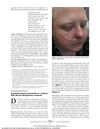25 citations,
May 2011 in “Dermatologic therapy” New treatments for alopecia areata may target specific immune cells and pathways involved in hair loss.
 July 2023 in “Journal of allergy and clinical Immunology. Global”
July 2023 in “Journal of allergy and clinical Immunology. Global” A 10-month-old boy with a rare combination of genetic conditions has severe immune deficiency and treatment challenges.
Finasteride may help treat childhood brain tumors by activating certain genes.
 9 citations,
May 2013 in “JAMA Dermatology”
9 citations,
May 2013 in “JAMA Dermatology” Sunlight exposure improved a patient's skin condition, and there may be a link between a certain disease and skin growths; a leukemia treatment caused changes in hair color and growth.
 August 2019 in “Regenerative Medicine”
August 2019 in “Regenerative Medicine” In June 2019, the stem cell research field saw major progress, including new clinical trials, FDA approvals, and industry collaborations.
 June 2017 in “Journal of clinical and investigative dermatology”
June 2017 in “Journal of clinical and investigative dermatology” Red blood cell folate levels are reliable indicators of long-term folate status in alopecia areata patients.
 19 citations,
September 1989 in “Journal of The American Academy of Dermatology”
19 citations,
September 1989 in “Journal of The American Academy of Dermatology” Minoxidil treatment may cause hair loss.
 February 2022 in “Research Square (Research Square)”
February 2022 in “Research Square (Research Square)” High TSPEAR levels in colorectal cancer predict worse outcomes.
 January 2022 in “Research Square (Research Square)”
January 2022 in “Research Square (Research Square)” High TSPEAR levels in colorectal cancer predict worse outcomes.
 11 citations,
September 2011 in “British Journal of Dermatology”
11 citations,
September 2011 in “British Journal of Dermatology” New ABCA12 gene mutations were linked to a skin condition with scaling and hair loss, and a treatment helped with hair loss in a related case.
 50 citations,
December 1999 in “British Journal of Dermatology”
50 citations,
December 1999 in “British Journal of Dermatology” Finasteride improves hidradenitis suppurativa but not for child-bearing women.
 34 citations,
November 2008 in “British Journal of Dermatology”
34 citations,
November 2008 in “British Journal of Dermatology” Hair extensions can cause hair loss and scalp damage, and these problems might be more common than people realize.

COVID-19 may trigger or worsen rapid hair loss in alopecia areata.
 9 citations,
May 2013 in “JAMA Dermatology”
9 citations,
May 2013 in “JAMA Dermatology” A woman's hair turned white after taking a cancer drug called dasatinib.
 3 citations,
January 2015 in “Nasza Dermatologia Online”
3 citations,
January 2015 in “Nasza Dermatologia Online” Some treatments for autoimmune hair loss work, but JAK inhibitors like tofacitinib are promising for regrowth.
 95 citations,
April 2013 in “PLOS ONE”
95 citations,
April 2013 in “PLOS ONE” Ginseng is possibly safe but its effectiveness is unclear due to poor quality studies and mixed results.
 40 citations,
July 2017 in “Frontiers in Medicine”
40 citations,
July 2017 in “Frontiers in Medicine” Early and personalized treatment for hair loss in young people is crucial to prevent permanent damage and should include psychological support.
 26 citations,
March 2014 in “Journal of cutaneous medicine and surgery”
26 citations,
March 2014 in “Journal of cutaneous medicine and surgery” Topical vitamin D is useful for some skin conditions but not effective for others, and more research is needed.
 19 citations,
October 1994 in “Tumori Journal”
19 citations,
October 1994 in “Tumori Journal” As of 1994, treatments for liver cancer had not significantly improved patient survival.
 15 citations,
January 2013 in “European Journal of Pediatrics”
15 citations,
January 2013 in “European Journal of Pediatrics” Patients with Shwachman-Diamond syndrome often get misdiagnosed due to a wide range of symptoms, including immune system problems and bone abnormalities.
 2 citations,
May 2021 in “Case reports in dermatological medicine”
2 citations,
May 2021 in “Case reports in dermatological medicine” A 28-year-old man with type 1 diabetes had skin and hair issues due to zinc deficiency.

Melatonin can improve treatment and extend remission for certain skin conditions.
 September 2013 in “Neurodegenerative disease management”
September 2013 in “Neurodegenerative disease management” Teriflunomide is effective and generally safe for treating relapsing multiple sclerosis, reducing relapse rates and disability progression.
April 2024 in “International journal of molecular sciences” Alopecia areata and vitiligo share immune system dysfunction but differ in specific immune responses and affected areas.
75 citations,
March 2018 in “Molecules/Molecules online/Molecules annual” L-Cysteine may have health benefits, but its effectiveness is still debated due to limited clinical trial data.
2 citations,
April 2023 in “Polymers” The study created 3D-printed pills that effectively release a hair loss treatment drug over 24 hours.
June 2020 in “Authorea (Authorea)” First-time mothers had higher stress hormone levels in late pregnancy than mothers who had given birth before.
 27 citations,
October 2017 in “British Journal of Dermatology”
27 citations,
October 2017 in “British Journal of Dermatology” Patients with GATA2 deficiency show early skin symptoms that help diagnose the condition.
 January 2023 in “Applied sciences”
January 2023 in “Applied sciences” Gefitinib and Sasam-Kyeongokgo together significantly reduce cancer growth and improve immune response in mice.
 19 citations,
November 2018 in “Nutrients”
19 citations,
November 2018 in “Nutrients” Annurca apple extract may protect mouse hair from damage by chemotherapy and could help treat hair loss without promoting cancer growth.























